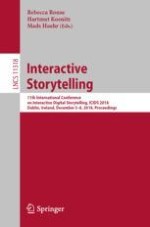2018 | OriginalPaper | Buchkapitel
Science Considered Helpful
verfasst von : R. Michael Young
Erschienen in: Interactive Storytelling
Aktivieren Sie unsere intelligente Suche, um passende Fachinhalte oder Patente zu finden.
Wählen Sie Textabschnitte aus um mit Künstlicher Intelligenz passenden Patente zu finden. powered by
Markieren Sie Textabschnitte, um KI-gestützt weitere passende Inhalte zu finden. powered by
